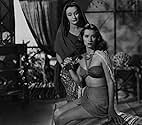Andrea Palma(1903-1987)
- Actress
- Additional Crew
Andrea Palma became the first diva of Mexican cinema, when she appeared
in the tragic leading role of Rosario, the prostitute of La mujer del puerto (1934), one
of the iconic films of the "cine de pecadoras" genre that became a
staple in the Mexican film industry. Andrea was the daughter of Julio
Bracho Zuloaga, a wealthy land and textile factory owner who lost all
his possessions during the Mexican revolution. Mr. Bracho moved his
family to Mexico City, where Andrea became interested in theater during
her school years, and later in fashion and hat design. She entered the
hat business in the early 1920s and opened her own shop, called Casa
Andrea (from where she took her first name as an actress, adding the
last name of one of her clients, the elegant Mrs. Palma.) Known in the
theater world, she had her first opportunity replacing her friend
Isabela Corona when the actress gave birth to a child. She closed the shop and
remained with the theater company and traveled to the United States,
where she stayed until the early 1930s, helped by a young and
struggling Cecil Kellaway, having small roles in the films of her cousins
Dolores Del Río and Ramon Novarro and as hat and make-up consultant for Marlene Dietrich, when
the German diva arrived in Hollywood. When she was called from Mexico
and offered the part of Rosario, it was Dietrich's style that inspired
her in creating her character. The languid, stylized and slim figure of
Rosario stood out in a milieu of drunken sailors and ordinary
prostitutes. La mujer del puerto (1934) became an instant success and Andrea Palma became
a superstar, practically out of nowhere. In the succeeding years, she
was much in demand: her next movie was completely opposite to Rosario,
playing the famous 17th century poet, playwright and nun Sor Juana Inés
de la Cruz; she returned to Hollywood to make two "Latin film", took a
four-year break doing theater and in 1943 she was directed by her
brother Julio Bracho in the classic melodrama Une aube différente (1943). She played Julieta, a
frustrated wife during the day and a prostitute during the night, and
it is considered by many the best role and film in her career. After
other movies, including a Tarzan vehicle, starring Johnny Weissmuller, in which
she played the mother of actress Linda Christian, Andrea went to Spain to
perform in a play and during rehearsals she met actor 'Enrique Díaz
'Indiano'' who became her only husband. When Andrea returned to
Mexico, she was no longer considered a young leading lady and became
specialized in character roles. In the 1950s she was in two classic
"pecadoras" productions and huge commercial successes starring Cuban
superstar Ninón Sevilla and directed by Alberto Gout, playing a mean brothel owner
in Maison de rendez-vous (1950) and a suffering wife in Femmes interdites (1951); and she worked with Luis Buñuel
in La vie criminelle d'Archibald de la Cruz (1955). Although she worked in the Mexican film industry until the
70s, Andrea Palma concentrated in television and theater since the late
1950s, including her weekly appearance as hostess of the popular series
"La novela semanal", based on literature classics, until her retirement
in 1979 due to illness. Her last role was besides her niece and
goddaughter Diana Bracho in the series Ángel Guerra (1979).











